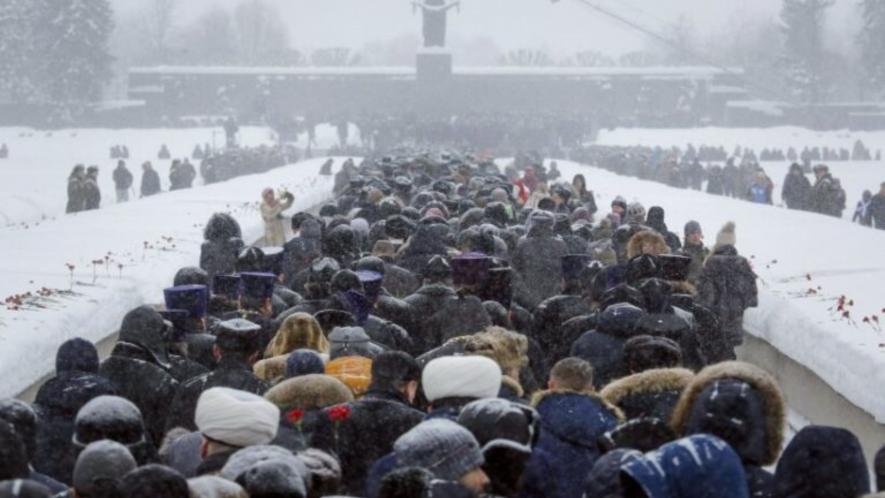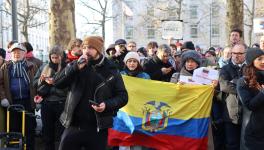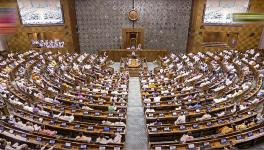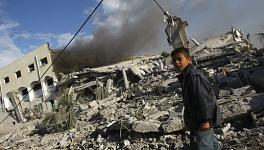An Anniversary West Would Rather Forget

On the 75th anniversary of the battle that lifted the Siege of Leningrad in World War 2, people walk in snowfall to the Motherland monument to place flowers at the Piskaryovskoye Cemetery where the victims were buried, St. Petersburg, Russia, January 26, 2019
An epochal anniversary from the annals of modern history is coming up in another ten days that remains a living memory for the Russian people. The Siege of Leningrad, arguably the most gruesome episode of the Second World War, which lasted for 900 days, was finally broken by the Soviet Red Army on January 27, 1944, eighty years ago to be exact.
The siege endured by more than three million people, of whom nearly one half died, most of them in the first six months when the temperature fell to 30° below zero. It was an apocalyptic event. Civilians died from starvation, disease and cold. Yet it was a heroic victory. Leningraders never tried to surrender even though food rations were reduced to a few slices of bread mixed with sawdust, and the inhabitants ate glue, rats — and even each other — while the city went without water, electricity, fuel or transportation and was being shelled daily.
It was on June 22, 1941 that the German armies crossed the Russian frontiers. Within six weeks, the Army Group North of the Wehrmacht, armed forces of the Third Reich, was within 50 km of Leningrad in a fantastic blitzkrieg and had advanced 650 km deep into Soviet territory.
A month later, the Germans had all but completed the city’s encirclement, only a perilous route across Lake Ladoga to the east connected Leningrad with the rest of Russia. But the Germans got no further. And 900 days later their retreat began.
The epic siege of Leningrad was the longest endured by any city since Biblical times, and, equally, citizens became heroes — artists, musicians, writers, soldiers and sailors who stubbornly resisted the iron from entering their souls. Petrified by the prospect of surrender to the Soviet Union, the Nazis preferred to lay down arms before the western allied forces, but Gen. Dwight Eisenhower, Supreme Commander of the Allied Expeditionary Force in Europe, ordered that the honour of victory should go to the Red Army.
Herein lies one of the greatest paradoxes of war and peace in modern times. Today, the anniversary of the siege of Leningrad has become, most certainly, an occasion that the US and many of its European allies would rather not remember. Yet, its contemporary relevance is not to be glossed over, either.
The Nazi leadership aimed to exterminate Leningrad’s entire population by enforced starvation. Death by starvation was a deliberate act on the part of the German Reich. In the words of Joseph Goebbels, Adolf Hitler “intended to have cities like Moscow and St Petersburg wiped out.” This was “necessary”, he wrote in July 1941, “because if we want to divide Russia into its individual parts,” it should “no longer have a spiritual, political or economic centre.”
Hitler himself declared in September 1941, “We have no interest in maintaining even a part of the metropolitan population in this existential war.” Any talk of the city surrendering had to be “rejected, as the problem of keeping and feeding the population cannot be solved by us.”
Simply put, the population of Leningrad was left to starve to death – much like the millions of Soviet prisoners of war held by the Wehrmacht. The historian Jörg Ganzenmüller later wrote that this form of mass murder was cost-effective for Berlin, for, it was “genocide by simply doing nothing”.
“Genocide by doing nothing”! Those chilling words are as well applicable today to the West’s “sanctions from hell” with an ulterior agenda to “erase” Russia and carve out five new states from its vast landmass with fabulous resources that can be subjugated by the industrial world.
The mother of all ironies is that Germany is even today at the forefront of the “genocide by doing nothing” strategy to weaken and bring down the Russian Federation on its knees. The Biden administration depended on a troika of three German politicians to do the heavy lifting in that failed effort to erase Russia — EU’s top bureaucrat in Brussels Ursula von der Layen, German Chancellor Olaf Schulz and Foreign Minister Annalena Baerbock.
George Santayana, the Spanish-American philosopher, essayist, poet, and novelist once said, “Those who cannot remember the past are condemned to repeat it.” This is how the far-right thrives.
In Germany and elsewhere, younger generations are becoming indifferent to the history of fascism. The idea of a Fourth Reich has entered an unprecedented heyday and is currently experiencing a new phase of normalisation in Europe. The tumultuous political upheaval throughout the western world provides the backdrop today.
The author of The Fourth Reich: The Specter of Nazism from World War II to the Present, historian and professor of history and Judaic studies Gavriel Rosenfeld has written that “The only way to mute the siren call of the Fourth Reich is to know its full history. Although it is increasingly difficult in our present-day world of fake ‘facts’ and deliberate disinformation to forge a consensus about historical truth, we have no alternative but to pursue it.”
The justification of political violence is classically fascist. This past week, we saw a breathtaking spectacle at the International Court of Justice (ICJ) in Hague reminding us that we are now in fascism’s legal phase. If the Nazis used Judeo-Bolshevism as their constructed enemy, Israel is doing the same thing by raising the bogeyman of Hamas. Fascism feeds off a narrative of supposed national humiliation by internal enemies.
Meanwhile, what gets forgotten is that there has been a growing fascist social and political movement in Israel for decades. Like other fascist movements, it is riddled with internal contradictions, but this movement now has a classically authoritarian leader in Prime Minister Benjamin Netanyahu who has shaped and exacerbated it, and is determined that in his time in politics it will be normalised.
The probability is high that in a matter of a few days, the ICJ will give some sort of interim order/injunction to Israel to end the violence against the hapless Palestinians in Gaza. But the fascist movement Netanyahu now leads preceded him, and will outlive him.
These are forces that feed off ideologies with deep roots in Jewish history. They may be defending a fictional glorious and virtuous national past, but it would be a grave error to think they cannot ultimately win.
The Russians are learning this home truth the hard way in Ukraine where “de-nazification” is turning out to be the weakest link in their special military operation, given its geopolitical moorings traceable to Germany’s dalliance with the Ukrainian Neo-Nazi groups in Kiev in the run-up to the 2014 coup, which the US inherited gleefully and wouldn’t let go.
MK Bhadrakumar is a former diplomat. He was India’s Ambassador to Uzbekistan and Turkey. The views are personal.
Courtesy: Indian Punchline
Get the latest reports & analysis with people's perspective on Protests, movements & deep analytical videos, discussions of the current affairs in your Telegram app. Subscribe to NewsClick's Telegram channel & get Real-Time updates on stories, as they get published on our website.
























